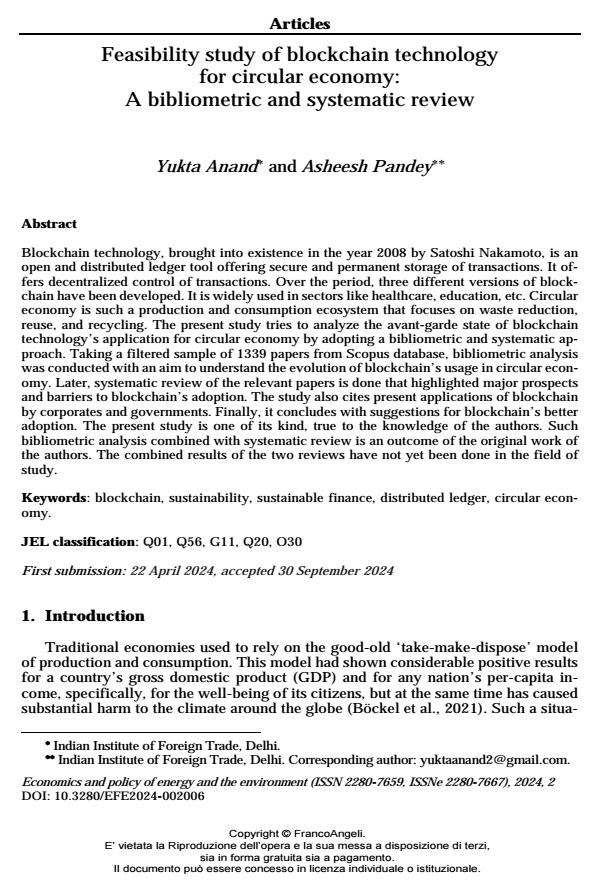Feasibility study of blockchain technology for circular economy: A bibliometric and systematic review
Titolo Rivista ECONOMICS AND POLICY OF ENERGY AND THE ENVIRONMENT
Autori/Curatori Yukta Anand, Asheesh Pandey
Anno di pubblicazione 2024 Fascicolo 2024/2
Lingua Inglese Numero pagine 36 P. 109-144 Dimensione file 479 KB
DOI 10.3280/EFE2024-002006
Il DOI è il codice a barre della proprietà intellettuale: per saperne di più
clicca qui
Qui sotto puoi vedere in anteprima la prima pagina di questo articolo.
Se questo articolo ti interessa, lo puoi acquistare (e scaricare in formato pdf) seguendo le facili indicazioni per acquistare il download credit. Acquista Download Credits per scaricare questo Articolo in formato PDF

FrancoAngeli è membro della Publishers International Linking Association, Inc (PILA), associazione indipendente e non profit per facilitare (attraverso i servizi tecnologici implementati da CrossRef.org) l’accesso degli studiosi ai contenuti digitali nelle pubblicazioni professionali e scientifiche.
Blockchain technology, brought into existence in the year 2008 by Satoshi Nakamoto, is an open and distributed ledger tool offering secure and permanent storage of transactions. It offers decentralized control of transactions. Over the period, three different versions of blockchain have been developed. It is widely used in sectors like healthcare, education, etc. Circular economy is such a production and consumption ecosystem that focuses on waste reduction, reuse, and recycling. The present study tries to analyze the avant-garde state of blockchain technology’s application for circular economy by adopting a bibliometric and systematic approach. Taking a filtered sample of 1339 papers from Scopus database, bibliometric analysis was conducted with an aim to understand the evolution of blockchain’s usage in circular economy. Later, systematic review of the relevant papers is done that highlighted major prospects and barriers to blockchain’s adoption. The study also cites present applications of blockchain by corporates and governments. Finally, it concludes with suggestions for blockchain’s better adoption. The present study is one of its kind, true to the knowledge of the authors. Such bibliometric analysis combined with systematic review is an outcome of the original work of the authors. The combined results of the two reviews have not yet been done in the field of study.
Parole chiave:blockchain, sustainability, sustainable finance, distributed ledger, circular economy.
Jel codes:Q01, Q56, G11, Q20, O30
Yukta Anand, Asheesh Pandey, Feasibility study of blockchain technology for circular economy: A bibliometric and systematic review in "ECONOMICS AND POLICY OF ENERGY AND THE ENVIRONMENT" 2/2024, pp 109-144, DOI: 10.3280/EFE2024-002006